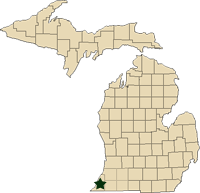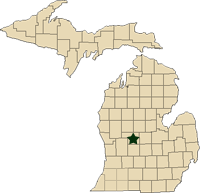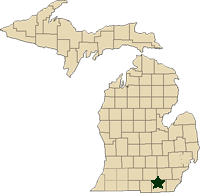Regional reports on Michigan vegetables – August 8, 2012
MSU Extension educators’ pest and vegetable updates for Michigan.
This week’s regional reports:
- Southwest Michigan – Ron Goldy
- Central Michigan – Fred Springborn
- Southeast Michigan – Lina Rodriguez Salamanca
Southwest Michigan – Ron Goldy, Michigan State University Extension
|
Weather
Temperatures for the period were again above average with highs from 76 to 93 F and lows from 53 to 69 F. The area received an inch of rain. Surface soil moisture is adequate, but deeper levels are still dry.
Crop reports
Harvest continues on all crops. Growers have welcomed the slower pace due to the cooler temperatures. Growers are beginning to remove plants from early planted fields and getting ready to remove the plastic.
Powdery mildew, squash bugs and viruses are quite prevalent in many squash and pumpkin fields. Many vine crops (cantaloupe, watermelon, pumpkin, fall squash) have early set fruit that is maturing, followed by later set fruit that formed after the hot weather. Later planted pumpkins are now producing female flowers and setting fruit.
Snap beans also have a dual set. Plants with mature pods are again flowering.
Central Michigan – Fred Springborn, Michigan State University Extension
|
Weather
Generally, we’ve had dry weather across the central region this week. Scattered rain and thundershowers did occur, giving moisture and in one instance hail to localized areas. High air temperatures were in the mid-80s with lows in the lower 50s to mid-60s.
Crops
Potato harvest will likely get underway in about a week in chip potatoes. Fresh table stock harvest is and has been underway on a small scale in central Michigan. Potato vines continue to deteriorate in most fields due to vine health and heat related issues. Late season weed control will be problematic in many fields this year; be mindful of preharvest intervals if considering a herbicide application.
Colorado potato beetle is present mostly as later instar larvae and adults. No reports of late blight yet here in Michigan, however Wisconsin has now confirmed late blight in three counties. Growers should continue to make fungicide applications to actively growing fields and vines.
Summer squash and zucchini harvest is continuing with fruit growing rapidly. Powdery mildew is present in many fields. Squash bug numbers are increasing.
Pickle harvest continues. I have not found downy mildew as of yet in Montcalm or adjacent counties.
Western bean cutworm pheromone traps continue to catch one or so moths per night; the end of flight is near. Scout sweet corn for western bean cutworm egg mass if at or near tassel emergence for the next week, especially if the planting is not receiving insecticide treatments for European corn borer or corn earworm.
Potato leafhopper adults and nymphs continue to be present. Numbers are variable and generally down from two weeks ago, but I still find fields where this pest is at or near threshold. This pest still needs to be scouted for.
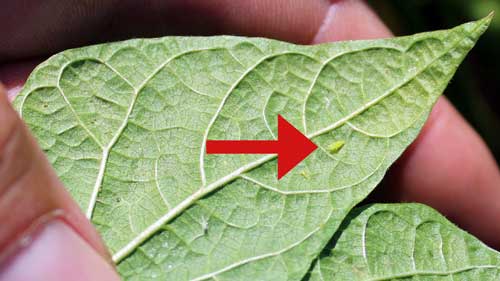
Potato leafhopper on the underside of a bean leaf in Bay County.
Photo credit: Fred Springborn, MSUE
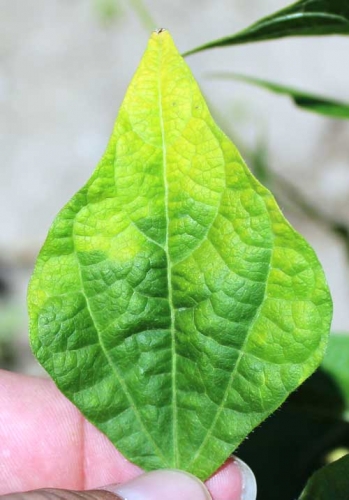
Yellowing of bean leaf due to hopper burn.
Photo credit: Fred Springborn, MSUE
Spider mites continue to be active in many areas in several fields in various crops. Keep this pest in mind when considering insecticide applications for other pests.
Southeast Michigan – Lina Rodriguez Salamanca, Michigan State University Extension
|
Weather
In the past week, the Hudson and Petersburg Enviro-weather stations recorded 23 to 94 percent relative humidity with nine to 13 hours of wetness. The southeast part of the state had 0.3 inches of rain in two rain events. We’ve had cooler mornings and evenings this past week.
Crops and pests
Cucurbit crop harvest continues. Growers that do not have irrigation systems in place can see how their yield has been impacted for the drought. In the Monroe County spore trap, cucurbit downy mildew counts reached 30 to 60 spores per hour last week. Scout your fields and keep up with the recommended spray program for your crops. Five counties have confirmed reports of cucurbit downy mildew, including Hillsdale County.
Powdery mildew is present on pumpkins and other cucurbits. Powdery mildew resistance to some fungicides has been documented in other states. Growers are encouraged to have fungicides programs that rotate fungicides groups to avoid buildup of resistance.
The leafhopper populations are declining in carrots. Mites continue to be a problem in green beans and eggplants.
Sweet corn harvest continues. High numbers of corn earworm moths were caught in the Monroe County trap – 47 moths on August 3 and 52 moths on August 7. Only one western bean cutworm was caught and no European corn borers have been found in the tap. Monitoring will continue.



 Print
Print Email
Email